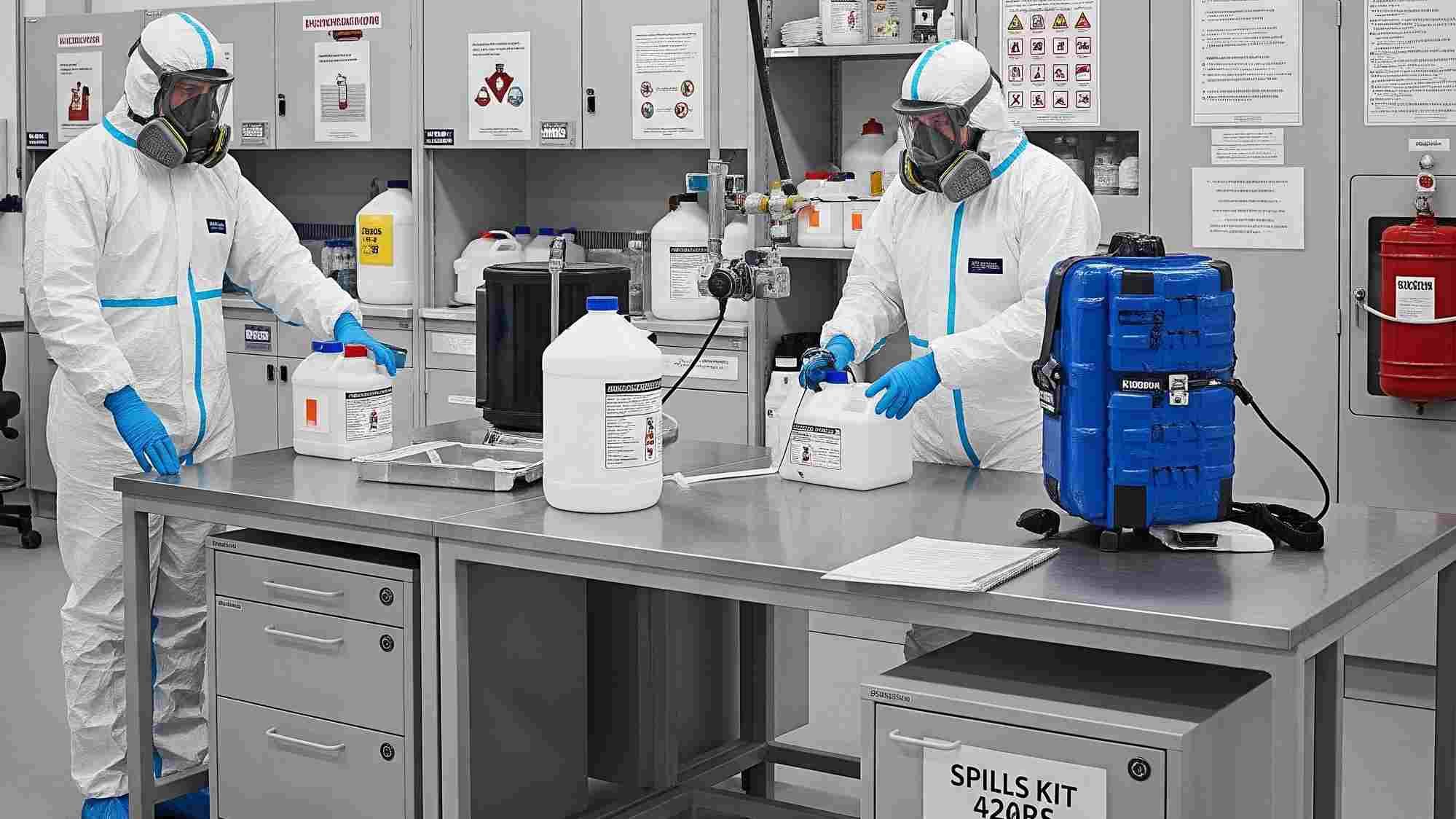Workplaces can be full of risks that aren’t always easy to see, with chemical hazards being among the most concerning. These substances can harm the brain and nervous system in ways that may not become apparent for years. From factories to construction sites, workers may come into contact with dangerous substances like heavy metals and solvents that, over time, can cause serious neurological problems.
These risks are often linked to occupational exposure and can lead to issues like memory loss, trouble focusing, or even physical symptoms like tremors. Understanding these dangers and how they affect brain health is crucial for workers, employers, and safety professionals. Today, we will explore the impact of these substances, examine how they cause harm, and discuss what can be done to protect workers and support those who have been affected.
Common Workplace Neurotoxins and Their Effects
Certain chemicals in workplaces are especially harmful to the nervous system. The two most common categories of workplace neurotoxins are heavy metals (such as lead, mercury, and cadmium) and solvents (including benzene, toluene, and xylene). These substances are prevalent in many industries, including manufacturing, painting, mining, and chemical production. They’re used in processes like metal smelting, paint formulation, battery production, and chemical synthesis.
Chronic exposure to these toxic substances can lead to severe health risks, including neurological damage, cognitive impairment, and organ dysfunction:
- Heavy Metals. These are often present in mining, battery manufacturing, and welding operations. Lead, for example, can build up in the body over time and damage nerve cells while disrupting how the brain communicates. Mercury exposure is common in some industrial processes and can cause tremors and memory problems. Cadmium, typically used in certain alloys, can harm the brain and kidneys with long-term exposure.
- Solvents. These are widely used for cleaning, degreasing, and in paints and adhesives. Solvents like toluene can affect the brain by altering nerve signals, leading to dizziness, confusion, or even unconsciousness in high doses. Long-term exposure to solvents may cause lasting damage to memory and attention span.
Both heavy metals and solvents pose significant risks because they can cross the blood-brain barrier, where they interfere with normal brain functions. Workers in these environments need to be aware of the dangers and take appropriate steps to limit their exposure.
Cognitive Decline Due to Chronic Exposure
One of the most alarming effects of long-term exposure to neurotoxins is cognitive decline, which refers to a gradual loss of mental abilities including memory, focus, and problem-solving skills. For workers exposed to harmful chemicals over the years, the brain can suffer damage in ways that aren’t immediately obvious.
For example, a painter regularly using solvent-based products might notice they’re forgetting small details or struggling to concentrate on tasks. Over time, these issues can worsen, making it harder to work effectively or manage daily life activities. Studies show that chronic exposure to heavy metals like lead can reduce mental function by damaging neurons, the brain cells responsible for processing information.
Similarly, solvents can disrupt the brain’s chemical balance, slowing down how quickly someone processes thoughts or reacts to situations. These changes might start small but can develop into serious issues, such as difficulty learning new skills or managing complex tasks. Workers in high-risk jobs, such as those in chemical plants or construction, are especially vulnerable if proper safety measures aren’t in place.
Neurological Symptoms from Chemical Hazards
Beyond cognitive problems, exposure to chemical hazards can cause a range of physical neurological symptoms. These can vary depending on the specific chemical and the level of exposure, but common symptoms often include:
- Headaches. Frequent or severe headaches can result from inhaling solvent vapors or handling heavy metals without proper protection.
- Tremors. Mercury exposure, for instance, can cause shaking hands or muscle twitches that interfere with fine motor skills.
- Numbness or Tingling. Some chemicals, like lead, can damage peripheral nerves, leading to sensations of numbness or pins-and-needles in the hands or feet.
- Dizziness or Balance Issues. Solvents like benzene can affect the brain’s ability to control balance, making workers feel unsteady or disoriented.
- Mood Changes. Exposure to neurotoxins can lead to irritability, anxiety, or even depression in some cases.
These symptoms can make it difficult for workers to perform their jobs safely and may signal early damage to the nervous system. If left unchecked, they can progress to more severe conditions, highlighting the critical need for early detection and intervention.
Understanding Neurotoxicity Mechanisms
Neurotoxicity refers to the ability of certain chemicals to damage the nervous system, including the brain, spinal cord, and peripheral nerves. This damage occurs through several key mechanisms that depend on the specific substance involved:
- Disrupting Nerve Signals. Solvents like toluene can interfere with how neurons send signals to each other by dissolving the fatty layers that protect nerve cells. This causes signals to misfire or slow down, leading to problems like confusion or poor coordination.
- Damaging Neurons. Heavy metals like lead or mercury can directly harm neurons by building up inside them. Over time, this accumulation can kill brain cells, leading to permanent loss of function in areas responsible for memory or motor control.
- Reducing Oxygen Supply. Some chemicals, like carbon disulfide (used in certain industrial processes), can reduce blood flow to the brain, starving it of oxygen and causing cell death.
- Triggering Inflammation. Exposure to neurotoxins can cause the brain to become inflamed, which can further damage neurons and disrupt normal brain health.
These mechanisms explain why prolonged or repeated exposure is so dangerous. Even small amounts of a neurotoxin, accumulated over time, can cause significant harm to brain health and overall neurological function.
Workplace Safety and Preventative Measures
Protecting workers from neurotoxins starts with implementing strong safety practices. Employers and workers can take several important steps to reduce the risks of occupational exposure to harmful chemicals:
- Personal Protective Equipment. Wearing appropriate PPE is essential and includes gloves, respirators, and face shields that can prevent skin contact or inhalation of harmful substances. For example, a properly fitted respirator can prevent workers from breathing in dangerous solvent vapors.
- Ventilation Systems. Adequate ventilation in workplaces can reduce the buildup of toxic vapors. Common solutions include fume hoods and exhaust fans, which are especially important in confined spaces like paint booths or chemical storage areas.
- Environmental Monitoring. Regular testing of air, water, and surfaces for heavy metals and solvents can detect high levels of toxins before they harm workers. Portable monitors and laboratory tests can provide early warnings of dangerous exposure levels.
- Training and Education. Workers should receive comprehensive training on the risks of neurotoxins and how to handle chemicals safely. This includes learning how to read safety data sheets (SDS) and understanding proper storage and disposal methods.
- Workplace Policies. Employers should enforce strict policies such as limiting exposure time to hazardous substances and requiring regular breaks in fresh air. Substituting safer chemicals when possible can also significantly reduce risks.
By combining these preventative measures, workplaces can significantly reduce the dangers posed by chemical hazards and protect workers’ long-term neurological health.
Rehabilitation and Support for Affected Workers
For workers who have already been exposed to neurotoxins, comprehensive support and rehabilitation are critical. The goal is to manage symptoms, improve quality of life, and, where possible, help workers return to safe employment. Available options include:
- Medical Treatment. Physicians may prescribe medications to manage symptoms like tremors or headaches. In severe cases, treatments like chelation therapy can remove heavy metals from the body, though this must be done under close medical supervision.
- Rehabilitation Therapy. Occupational therapy can help workers regain motor skills and adapt to physical limitations caused by neurological damage. Cognitive therapy, including memory exercises and problem-solving tasks, can support those experiencing cognitive decline.
- Vocational Support. For workers who cannot return to their previous roles, vocational rehabilitation programs can teach new skills or help them transition to safer jobs. These programs often include job coaching and workplace accommodations.
- Counseling and Mental Health Support. Dealing with neurological symptoms can be emotionally challenging. Professional counseling can help workers cope with anxiety, depression, or frustration caused by their condition.
- Legal and Financial Assistance. Workers affected by occupational exposure may be eligible for workers’ compensation or other benefits. Legal support can help them navigate claims and secure resources for medical care or lost wages.
Employers, healthcare providers, and government agencies should work together to ensure affected workers receive the care and resources they need. Early intervention can make a significant difference in recovery and long-term outcomes.
Protecting brain health in the workplace is a shared responsibility that requires commitment from all stakeholders. When employers understand the risks of heavy metals, solvents, and other chemical hazards, they can work with employees to take action to prevent neurotoxicity. Strong safety measures, regular monitoring, and proper training can reduce occupational exposure and minimize its harmful effects. For those already affected, timely medical treatment and comprehensive support can help manage symptoms and improve quality of life. Raising awareness about these dangers is the first step toward creating safer workplaces and protecting workers’ neurological health for years to come.













I've given up... the stress her office staff has put me through is just not worth it. You can do so much better, please clean house, either change out your office staff, or find a way for them to be more efficient please. You have to do something. This is not how you want to run your practice. It leaves a very bad impression on your business.
Please, leave your review
Write a comment: